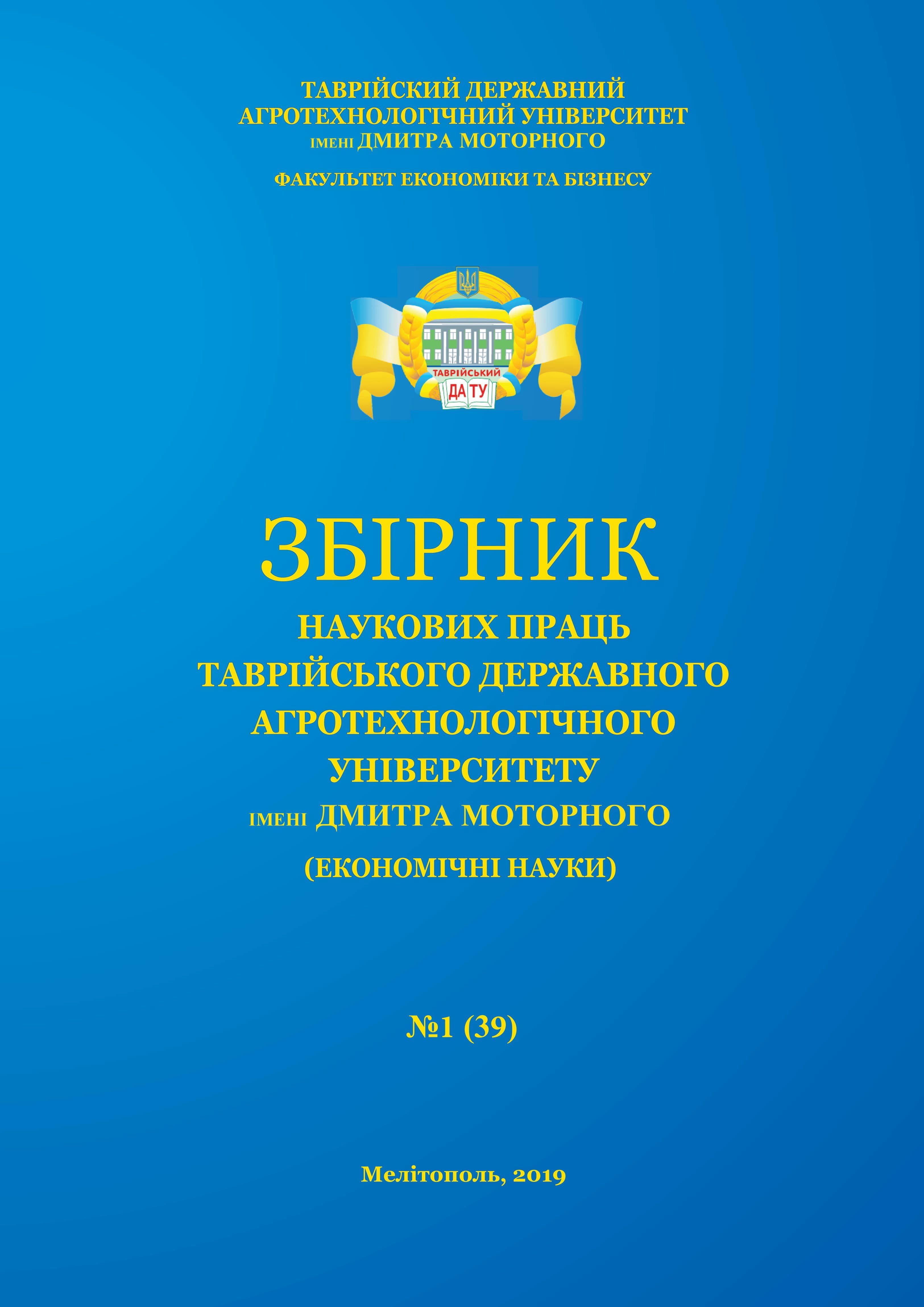РОЛЬ САМОМЕНЕДЖМЕНТУ В ДОСЯГНЕННІ ЦІЛЕЙ МЕНЕДЖЕРА В ОРГАНІЗАЦІЇ
Ключові слова:
самоменеджмент, менеджер, організація, методи, саморозвиток, самовдосконалення, самоорганізація, самомотивація.
Анотація
Анотація. У статті досліджено основні підходи до визначення самоменеджменту зарубіжними та українськими науковцями. Обґрунтовано необхідність самоменеджменту в сучасних умовах, як засобу ефективності в досягненні цілей менеджера.
Посилання
1. Андрющенко К.А. Теоретичні аспекти самоменеджменту: умови виникнення і розвитку / К.А. Андрющенко // Ефективна економіка. – 2010. – №7. – [Електронний ресурс]. – Режим доступу: http://www.m.nayka.com.ua/?op=1&j=efektyvnaekonomika& s=ua&z=258
2. Бабчинська О.І. Самоменеджмент як складова професійного розвитку персоналу [Електронний ресурс] / О.І.Бабчинська, А.К. Мідляр. - Режим доступу:http://www.economy.nayka.com.ua/?op=1&z=5151.
3. Бишоф А. Самоменеджмент. Эффективно и рационально / А.Бишоф, К.Бишоф; [пер. с нем. Д. А. Пергамент]. — 2-е изд., испр. — М.: Омега-Л, 2006. — 127 с.
4. Буняк Н.М. Самоменеджмент як мистецтво саморозвитку особистості / Н.М. Буняк // [Електронний ресурс] Глобальні та національні проблеми економіки. – 2017, № 8. – Режим доступу: http://globalnational.in.ua/archive/18-2017/36.pdf
5. Вуддкок М. Раскрепощенный менеджер. Для руководителя практики: Пер. с англ. /М.Вуддкок Д. Френсис.-М.: «Дело».1991.-320с.
6. Дороніна, М. С. Самоменеджмент: сутність, умови виникнення і розвитку / М. С. Дороніна, В. І. Пересунько // Економіка і управління. – 2006. – № 4. – С. 7–12.
7. Зайверт Л. Ваше время – в Ваших руках: (Советы руководителям, как эффективно использовать рабочее время). – М.: Экономика, 1991. – 21 c.
8. Кирій С.Л. Концепція самоменеджменту як управлінська філософія / С.Л. Кирій // Теорія і практика державного управління. – 2014, №3(46). [Електронний ресурс]. – Режим доступу: http://www.kbuapa.kharkov.ua/e-book/tpdu/2014-3/doc/4/02.pdf.
9. Ларионова, И. А. Самореализация как системообразующий фактор интегративной профессиональной подготовки специалистов / И. А. Ларионова // Педагогическое образование в России. — 2011. — № 4. — С. 18-27.
10. Лисенко В. В. Вплив функцій та технологій самоменеджменту на розвиток персоналу підприємства [Електронний ресурс] / В. В. Лисенко, І. А. Приходько // Інфраструктура ринку. – 2018. – № 19. – С. 251–256.- Режим доступу: http://www.market-infr.od.ua/journals/2018/19_2018_ukr/43.pdf
11. Лукашевич Н.П. Теория и практика самоменеджмента: [учеб. пособ.] / Н.П. Лукашевич. – К.: МАУП, 1999. – 360 с.
12. Панова Н. В. Роль самоменджмента, мотивации и рефрейминга в достижении эффективности деятельности специалиста / Н. В. Панова // Экономикс. – 2013. – № 2. – С. 19-23.
13. Самоменеджмент педагога: сущность, содержание, технологии [Текст]: монография / А. А. Симонова. — Екатеринбург: Урал. гос. пед. ун-т, 2008. — 136 с.
14. Чкан А.С. Самоменеджмент як головний інструмент системи мотиваційного менеджменту на підприємстві / А.С.
Чкан, І.В. Ганза // Збірник наукових праць Таврійського державного агротехнологічного університету (економічні науки). – 2014. – №1(25). – С. 261-266.
15. Штепа О.С. Самоменеджмент: дефініція та діагностика / О. С. Штепа // Наука і освіта. Науково-практичний журнал Південно-українського університету АПН України. Спецвипуск “Психологія особистості: теорія, досвід, практика”. – 2009. – № 8. – С. 128–130.
2. Бабчинська О.І. Самоменеджмент як складова професійного розвитку персоналу [Електронний ресурс] / О.І.Бабчинська, А.К. Мідляр. - Режим доступу:http://www.economy.nayka.com.ua/?op=1&z=5151.
3. Бишоф А. Самоменеджмент. Эффективно и рационально / А.Бишоф, К.Бишоф; [пер. с нем. Д. А. Пергамент]. — 2-е изд., испр. — М.: Омега-Л, 2006. — 127 с.
4. Буняк Н.М. Самоменеджмент як мистецтво саморозвитку особистості / Н.М. Буняк // [Електронний ресурс] Глобальні та національні проблеми економіки. – 2017, № 8. – Режим доступу: http://globalnational.in.ua/archive/18-2017/36.pdf
5. Вуддкок М. Раскрепощенный менеджер. Для руководителя практики: Пер. с англ. /М.Вуддкок Д. Френсис.-М.: «Дело».1991.-320с.
6. Дороніна, М. С. Самоменеджмент: сутність, умови виникнення і розвитку / М. С. Дороніна, В. І. Пересунько // Економіка і управління. – 2006. – № 4. – С. 7–12.
7. Зайверт Л. Ваше время – в Ваших руках: (Советы руководителям, как эффективно использовать рабочее время). – М.: Экономика, 1991. – 21 c.
8. Кирій С.Л. Концепція самоменеджменту як управлінська філософія / С.Л. Кирій // Теорія і практика державного управління. – 2014, №3(46). [Електронний ресурс]. – Режим доступу: http://www.kbuapa.kharkov.ua/e-book/tpdu/2014-3/doc/4/02.pdf.
9. Ларионова, И. А. Самореализация как системообразующий фактор интегративной профессиональной подготовки специалистов / И. А. Ларионова // Педагогическое образование в России. — 2011. — № 4. — С. 18-27.
10. Лисенко В. В. Вплив функцій та технологій самоменеджменту на розвиток персоналу підприємства [Електронний ресурс] / В. В. Лисенко, І. А. Приходько // Інфраструктура ринку. – 2018. – № 19. – С. 251–256.- Режим доступу: http://www.market-infr.od.ua/journals/2018/19_2018_ukr/43.pdf
11. Лукашевич Н.П. Теория и практика самоменеджмента: [учеб. пособ.] / Н.П. Лукашевич. – К.: МАУП, 1999. – 360 с.
12. Панова Н. В. Роль самоменджмента, мотивации и рефрейминга в достижении эффективности деятельности специалиста / Н. В. Панова // Экономикс. – 2013. – № 2. – С. 19-23.
13. Самоменеджмент педагога: сущность, содержание, технологии [Текст]: монография / А. А. Симонова. — Екатеринбург: Урал. гос. пед. ун-т, 2008. — 136 с.
14. Чкан А.С. Самоменеджмент як головний інструмент системи мотиваційного менеджменту на підприємстві / А.С.
Чкан, І.В. Ганза // Збірник наукових праць Таврійського державного агротехнологічного університету (економічні науки). – 2014. – №1(25). – С. 261-266.
15. Штепа О.С. Самоменеджмент: дефініція та діагностика / О. С. Штепа // Наука і освіта. Науково-практичний журнал Південно-українського університету АПН України. Спецвипуск “Психологія особистості: теорія, досвід, практика”. – 2009. – № 8. – С. 128–130.
Опубліковано
2019-09-11

